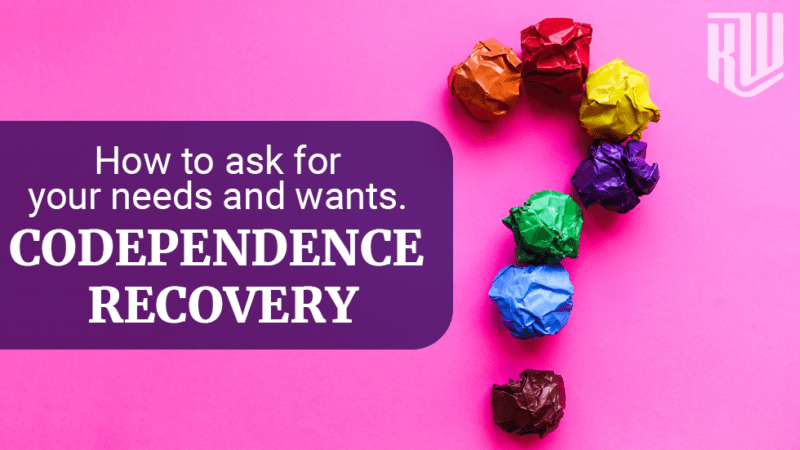Welcome back! This is a continuation of a three-part series on codependence recovery . The first is on determining our morals and values.
Today I am showing the difference between a need and a want and the five main ways codependent people cannot meet their needs and wants.
Finally, I’ll end with some questions to ask yourself to begin identifying and meeting your own needs and wants.
What’s the difference between a need and want?
Needs are things that must be fulfilled for us to survive. I’ve identified five: food, clothing, shelter, intimacy + connection (including all types of intimacy like physical and spiritual), and money (or some sort of income).
Wants are different: they bring us joy! There are little wants (like candy or a drink) and big wants (like a house or big trip).
This leads us into the five main ways codependent people don’t meet their needs and wants:
- They pursue their wants over their needs. That pursuit sacrifices their ability to meet their needs. They will go on a nice trip which sacrifices food or rent.
- Because of such deprivation as a child when their basic needs weren’t met (primarily emotional needs), they were so deprived they didn’t experience joy.
- There’s such an abandonment hole they search for any sense of feeling to feel better. They end up putting themselves in continued deprivation.
- They pursue meeting other people’s needs and wants over their own. They may volunteer, but their house is in complete disarray.
- They make dinner for a sick friend but not their family. They may ignore their own health conditions.
- They work well below their capabilities or work in jobs they don’t like. As a result, they are not meeting their need to take care of themselves financially.
- Because of neglect in childhood, they fear intimacy.
- As a result, they don’t know how to ask for their intellectual, spiritual, and emotional connection needs.so they create fights. It’s their representation of connection even though it’s truly disconnection.
They don’t seek medical care, but they demand others receive care.
- This leads me into a story about Lou Gehrig, a famous baseball player. He played some 2100 games without missing one game.
- He had 13 or so fractures in his hand during that time. A rookie on his team got the flu one day, and Lou demanded he not play.
- Lou took him to his mother’s house and helped nurse him to health. This is what causes ALS and Lou Gehrig’s disease: the inability to care for yourself.
- These people “give” so much their bodies can no longer support themselves.
What does this look like in real life?
For example, one of my clients came in and told me she ran out of toilet paper and couldn’t bring herself to get a new roll from the closet and put it on the roll. So instead.
she would use a different bathroom in her house. She didn’t feel she was worthy of changing and meeting her basic need to take care of herself.
That’s how devastating this can become.
An antidote from my life: I once starved myself. I was young and reaching into the fridge to get cottage cheese. As I reached in, my mom screamed at me that it was for the dogs.
I wanted her approval, so I put it back. My mom meant she used the cottage cheese to hide the pills when the dogs were sick. What I heard was. “If you eat, I don’t love you. If you eat, you’re in trouble. And finally, we feed the dogs before we feed the kids”
. Did my mom actually say any of this?
Of course not. This is what I mean when I repeatedly say that we’ve all been through abusive parenting. No one taught my mother that needed further explanation.
To keep me safe, the resolution I came up with was not to eat. I was playing professional hockey, eating hardly anything.
The false defense mechanism I made was telling myself eating “bores” me.
Until I started the healing work, I had no idea how my saying I did not like to eat was so out of reality.
Second story:
joy. I had no joy in my childhood, so I didn’t know how to experience it.
When I was playing hockey, my team took a trip to Czechoslovakia, Sweden, and Finland. On the days off we went sightseeing.
I have a stack of pictures of all the team pictures and the photos my friends took. I am the only person missing in all the photos.
I would stay on the bus. I didn’t look at any of it. I didn’t know how to meet my need and want for joy.
I left the bus twice: once to walk across the street and peer into a museum window and once to get something to eat. Not being able to experience joy is extremely common for someone who struggles with codependence.
Here are the questions I encourage you to ask yourself:
- Am I meeting my needs and wants?
- ? If not, what plan can I put into place to do so?
- How am I meeting everyone else’s needs and wants? Make a list and begin doing those things for yourself. You’ll know you’re doing it right if you feel guilty or selfish. That means you’ve probably moved into moderation. If you feel selfish, arrogant, and shameful. At the most, you’re probably moderate.
- What are the little wants you have? Please make a list and put a plan into place as long as they don’t sacrifice your needs.
- What are the big wants you have? Please make a list and put a plan into place as long as they don’t sacrifice your needs.
Finally, falsely empowered codependent people (on the other side of the spectrum) need to stop doing everything for themselves and begin asking for help. They’re anti-dependent people – I’ve done videos and articles on the falsely empowered codependent, and I encourage you to check them out. For the falsely empowered person, they’ll know they’re doing it right when they feel weak, vulnerable, whiny, and insecure. In reality, they probably moved a little towards moderation.
I hope this helps you – check out my other videos and articles to continue on the recovery journey.
I have created a masterclass that will provide you with the knowledge, skills, and tools to heal your codependence for those ready to conquer codependence.
Enjoy The Journey!
Check It Out!





